高中英语省略句整理版
- 格式:ppt
- 大小:1.42 MB
- 文档页数:16
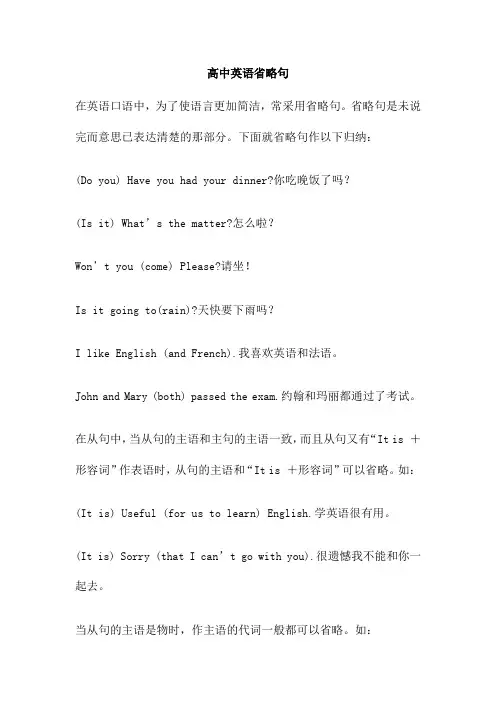
高中英语省略句在英语口语中,为了使语言更加简洁,常采用省略句。
省略句是未说完而意思已表达清楚的那部分。
下面就省略句作以下归纳:(Do you) Have you had your dinner?你吃晚饭了吗?(Is it) What’s the matter?怎么啦?Won’t you (come) Please?请坐!Is it going to(rain)?天快要下雨吗?I like English (and French).我喜欢英语和法语。
John and Mary (both) passed the exam.约翰和玛丽都通过了考试。
在从句中,当从句的主语和主句的主语一致,而且从句又有“It is +形容词”作表语时,从句的主语和“It is +形容词”可以省略。
如:(It is) Useful (for us to learn) English.学英语很有用。
(It is) Sorry (that I can’t go with you).很遗憾我不能和你一起去。
当从句的主语是物时,作主语的代词一般都可以省略。
如:The book (that I read yesterday) is very interesting.我昨天读的那本书很有趣。
在定语从句中,当先行词在定语从句中作状语时,关系代词可以省略。
如:The way (that/which) we use is more convenient.我们使用的方法更简便。
The reason (why) he was late is that he had to help the old lady across the street.他迟到的原因是他得帮助那位老太太过马路。
在一些表示建议、请求、命令等含义的动词后的宾语从句中,谓语动词常省略。
如:I suggest (that) we (should) discuss the matter.我建议我们讨论这个问题。
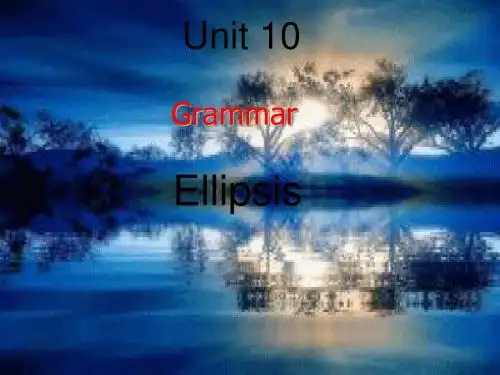
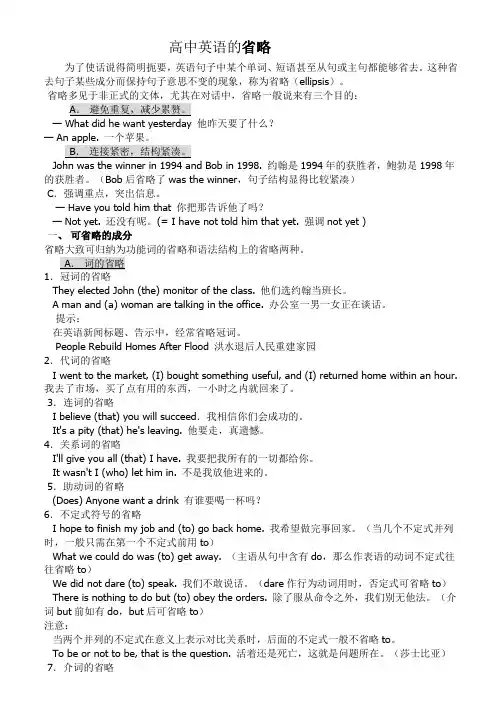
高中英语的省略为了使话说得简明扼要,英语句子中某个单词、短语甚至从句或主句都能够省去。
这种省去句子某些成分而保持句子意思不变的现象,称为省略(ellipsis)。
省略多见于非正式的文体,尤其在对话中,省略一般说来有三个目的:A.避免重复,减少累赘。
— What did he want yesterday 他昨天要了什么?— An apple. 一个苹果。
B.连接紧密,结构紧凑。
John was the winner in 1994 and Bob in 1998. 约翰是1994年的获胜者,鲍勃是1998年的获胜者。
(Bob后省略了was the winner,句子结构显得比较紧凑)C.强调重点,突出信息。
— Have you told him that 你把那告诉他了吗?— Not yet. 还没有呢。
(= I have not told him that yet. 强调not yet )一、可省略的成分省略大致可归纳为功能词的省略和语法结构上的省略两种。
A.词的省略1.冠词的省略They elected John (the) monitor of the class. 他们选约翰当班长。
A man and (a) woman are talking in the office. 办公室一男一女正在谈话。
提示:在英语新闻标题、告示中,经常省略冠词。
People Rebuild Homes After Flood 洪水退后人民重建家园2.代词的省略I went to the market, (I) bought something useful, and (I) returned home within an hour. 我去了市场,买了点有用的东西,一小时之内就回来了。
3.连词的省略I believe (that) you will succeed.我相信你们会成功的。
It's a pity (that) he's leaving. 他要走,真遗憾。

高中英语语法省略句 IMB standardization office【IMB 5AB- IMBK 08- IMB 2C】省略句为了使话说得简明扼要,英语句子中某个单词、短语甚至从句或主句都可以省去。
这种省去句子某些成分而保持句子意思不变的现象,称为省略(ellipsis)Ⅰ、状语从句中的省略用法一、如果从句的主语和主句的主语一致,且从句的谓语含有be动词的某种形式(am/is/are/was/were),可同时省略从句的主语和be动词的某种形式。
1、when,while引导的时间状语从句. Do be careful when (you are) crossing the street.When/While (I was) on my way to work, I met her.2、if,unless,once引导的条件状语从句. If (it is) properly treated, waste will do no harm to the environment.I’ll not go to the party unless (I am) invited.Once (you are) caught stealing in a supermarket, you will be punished.3、though,although,whether,no matter whether/what/how/who等引导的让步状语从句. He was happy, though/although (he was) poor.Whether (she is) sick or well, she is always cheerful.No matter how/However hard the task (is), we must fulfill it in time.(注:从句的主语和主句的主语不一致时,只省略从句中的be动词形式)4、as if,as though引导的方式状语从句. He rubbed his eyes and yawned as if/though (he was) waking up after a long sleep.He stood up as if/though (he wanted) to leave.(as if/though + to do表示一个将来的动作)二、than,as引导的比较状语从句中的省略用法:当不同的主语进行比较时,一般省略从句中的谓语;当从句中的主语与谓语(be动词除外)和主句中的主语与谓语相同时,通常省略从句中的主语和谓语,只保留比较部分。
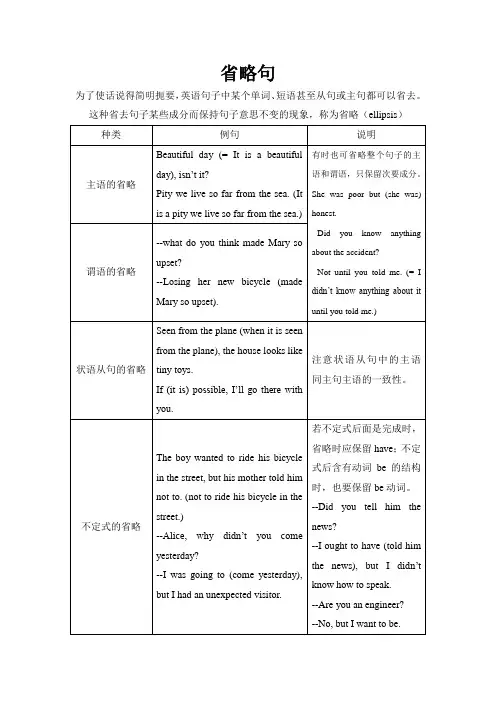
省略句为了使话说得简明扼要,英语句子中某个单词、短语甚至从句或主句都可以省去。
这种省去句子某些成分而保持句子意思不变的现象,称为省略(ellipsis)Ⅰ、状语从句中的省略用法一、如果从句的主语和主句的主语一致,且从句的谓语含有be动词的某种形式(am/is/are/was/were),可同时省略从句的主语和be动词的某种形式。
1、when,while引导的时间状语从句e.g. Do be careful when (you are) crossing the street.When/While (I was) on my way to work, I met her.2、if,unless,once引导的条件状语从句e.g. If (it is) properly treated, waste will do no harm to the environment.I’ll not go to the party unless (I am) invited.Once (you are) caught stealing in a supermarket, you will be punished.3、though,although,whether,no matter whether/what/how/who等引导的让步状语从句e.g. He was happy, though/although (he was) poor.Whether (she is) sick or well, she is always cheerful.No matter how/However hard the task (is), we must fulfill it in time.(注:从句的主语和主句的主语不一致时,只省略从句中的be动词形式)4、as if,as though引导的方式状语从句e.g. He rubbed his eyes and yawned as if/though (he was) waking up after along sleep.He stood up as if/though (he wanted) to leave.(as if/though + to do表示一个将来的动作)二、than,as引导的比较状语从句中的省略用法:当不同的主语进行比较时,一般省略从句中的谓语;当从句中的主语与谓语(be动词除外)和主句中的主语与谓语相同时,通常省略从句中的主语和谓语,只保留比较部分。

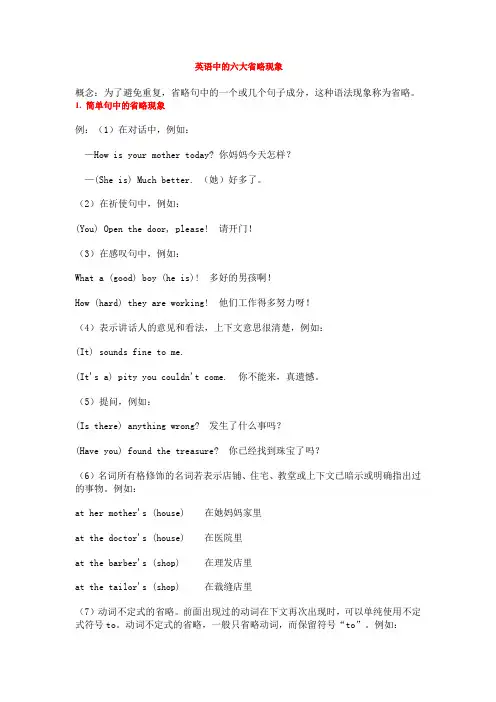
英语中的六大省略现象概念:为了避免重复,省略句中的一个或几个句子成分,这种语法现象称为省略。
1. 简单句中的省略现象例:(1)在对话中,例如:—How is your mother today? 你妈妈今天怎样?—(She is) Much better. (她)好多了。
(2)在祈使句中,例如:(You) Open the door, please! 请开门!(3)在感叹句中,例如:What a (good) boy (he is)! 多好的男孩啊!How (hard) they are working! 他们工作得多努力呀!(4)表示讲话人的意见和看法,上下文意思很清楚,例如:(It) sounds fine to me.(It's a) pity you couldn't come. 你不能来,真遗憾。
(5)提问,例如:(Is there) anything wrong? 发生了什么事吗?(Have you) found the treasure? 你已经找到珠宝了吗?(6)名词所有格修饰的名词若表示店铺、住宅、教堂或上下文已暗示或明确指出过的事物。
例如:at her mother's (house) 在她妈妈家里at the doctor's (house) 在医院里at the barber's (shop) 在理发店里at the tailor's (shop) 在裁缝店里(7)动词不定式的省略。
前面出现过的动词在下文再次出现时,可以单纯使用不定式符号to。
动词不定式的省略,一般只省略动词,而保留符号“to”。
例如:—Will you go with me? 你愿意跟我一块去吗?—Well, I'd like to(go with you). 我非常愿意。
I'd like to.也可用I'd love to. /I'd be happy to. 来取代。

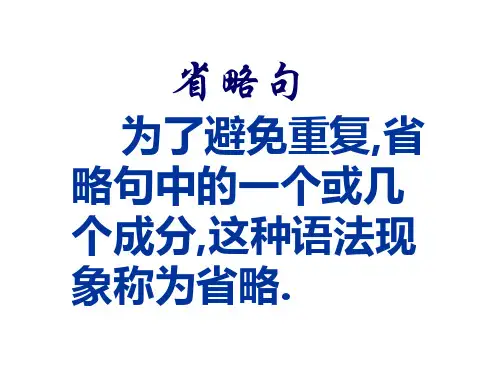
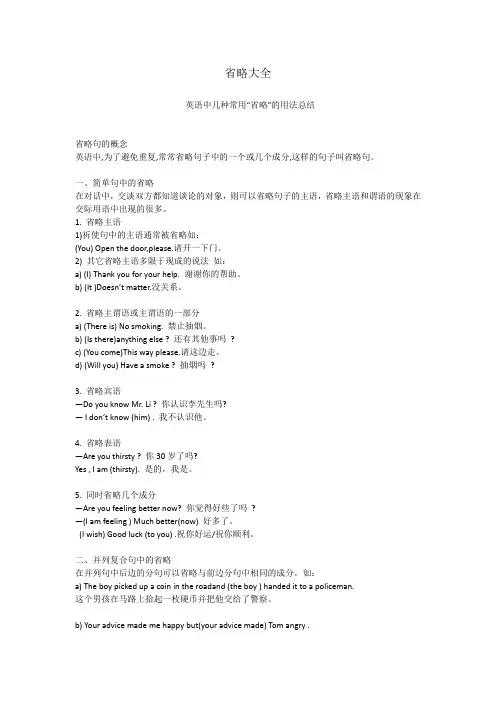
省略大全英语中几种常用“省略”的用法总结省略句的概念英语中,为了避免重复,常常省略句子中的一个或几个成分,这样的句子叫省略句。
一、简单句中的省略在对话中,交谈双方都知道谈论的对象,则可以省略句子的主语,省略主语和谓语的现象在交际用语中出现的很多。
1. 省略主语1)祈使句中的主语通常被省略如:(You) Open the door,please.请开一下门。
2) 其它省略主语多限于现成的说法如:a) (I) Thank you for your help. 谢谢你的帮助。
b) (It )Doesn’t matter.没关系。
2. 省略主谓语或主谓语的一部分a) (There is) No smoking. 禁止抽烟。
b) (Is there)anything else ? 还有其他事吗?c) (You come)This way please.请这边走。
d) (Will you) Have a smoke ? 抽烟吗?3. 省略宾语—Do you know Mr. Li ? 你认识李先生吗?— I don’t know (him) . 我不认识他。
4. 省略表语—Are you thirsty ? 你30岁了吗?Yes , I am (thirsty). 是的,我是。
5. 同时省略几个成分—Are you feeling better now? 你觉得好些了吗?—(I am feeling ) Much better(now) 好多了。
(I wish) Good luck (to you) .祝你好运/祝你顺利。
二、并列复合句中的省略在并列句中后边的分句可以省略与前边分句中相同的成分。
如:a) The boy picked up a coin in the roadand (the boy ) handed it to a policeman.这个男孩在马路上拾起一枚硬币并把他交给了警察。
b) Your advice made me happy but(your advice made) Tom angry .你的建议使我高兴但使汤姆生气。
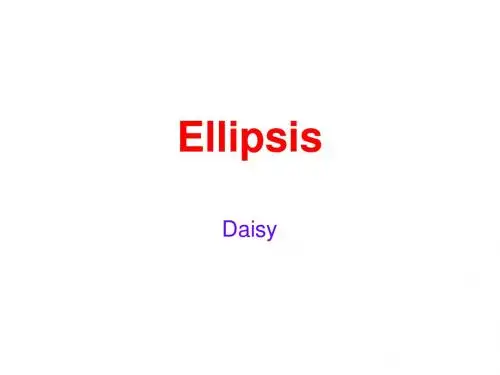
省略句为了使讲话和行文简洁,句中某些成分有时可省略。
省略可分以下几种情况:(一)简单句中的省略1、省略主语:祈使句中主语通常省略。
其它省略主语多限于少数现成的说法。
e.g. (I) Thank you for your help.(括号内为省略的词语,下同)(I) See you tomorrow.(It) Doesn’t matter.2、省略主谓语或主谓语的一部分。
e.g. (There is) No smoking.(Is there) Anything wrong?Why (do you) not say hello to him?3、省略作宾语的不定式短语,只保留to。
e.g. ---- Are you going there?---- I’d like to (go there).He did not give me the chance, though he had promised to (give me the chance).(动词:want, wish, expect, hope, like, love, try, forget, decide,prefer, mean, intend, plan, refuse…等动词宾语。
tell, ask, want, expect, warn…等动词的宾补。
形容词:glad, happy, pleased, delighted, …短语:be going to, be about to, be able to, have to, u sed to, ought to, …)注意:如果该宾语是be动词或完成时态,则须在to之后加上be或have。
e.g. ---- Are you an engineer?---- No, but I want to be.---- He hasn’t finished the task yet.---- Well, he ought to have.4、省略表语。
完整版)高中英语语法省略句Ellipsis is XXX omitting certain words。
phrases。
or XXX in order to make the XXX.One type of ellipsis is the n of the subject and predicate of a sentence。
XXX.For example。
"Beautiful day。
isn't it?" instead of "It is a beautiful day。
isn't it?"Another type is the n of the predicate。
XXX.For example。
"Pity we live so far from the sea" instead of "It is a pity we live so far from the sea."XXX。
XXX.For example。
"Seen from the plane。
the house looks XXX."When the infinitive is followed by the perfect tense。
the infinitive XXX.For example。
"The boy wanted to ride his bicycle in the street。
but his mother told him not to."In cases where the infinitive is followed by the verb "be," the verb "be" should be retained.For example。
1 省略句多变的省略句高考常考内容:1.省略主语,主谓语或主谓的一部分 2.不定式符号 to 的省略 3.不定式结构中动词的省略4.状语从句中的省略6.虚拟语气中 if 和 should 的省略掌握好省略句,应注意以下几条:5.定语从句中关系词的省略7.考查 not, so, neither, nor 的“替代性”省略1.感官动词或使役动词(如: notice, hear, let, make)等后接不定式作宾补时省略 to,被动时 to 不能省略。
2.在 pre fer to do rather than…, cannot help but…do,nothing…but等句型中常省略 to。
3.为避免重复,作某些动词(hope, want)等宾语或(tell, order, ask)的宾补时,省略不定式短语,只保留 to.4.应注意状语从句、定语从句中的省略。
5.注意 not ,so ,neither, nor 的“替代性”省略。
6.状语从句中,如果谓语含动词 be,主语又与主句主语一致或主语是 it,从句中主语和be 一齐省略。
7.常见的省略形式:(1) If (it is) possible[如果可能的话]; (2) If(it is) necessary[如果必要的话];(3) Ifany: 例: Correct the mistakes in thepassage if(there is) any (mistakes)比较:Do you have anything to say? ( 不知道对方是否有话要说,) Do you have something to say?(认为对方有话要说.)一、替代省略1. 用 it, one, that,ones, those 替代句子中重复出现的名词、代词或句子。
one 是指代同名称的另一样东西(同类异物),代替前面句子中重复出现的可数名词;that 替代特指可数或不可数名词,后面常跟有 in 或 of 短语作后置定语;it 指代同名称的同样事物(同类同物)。
省略句1.省略句的定义省略是为了避免重复、突出新信息并使上下文紧密连接的一种语法修辞手段。
省略在语言中,尤其在对话中,是一种十分普遍的现象。
2.词的省略(1)省略介词He spent four hours (in) going over his lessons. 他花了四个小时复习功课。
I’ve studied Eng1ish (for) five years.我已学五年英语了。
(2)省略连词thatI believe (that) you will succeed.我相信你们会成功的。
It’s a pity (that) he’s leaving.他要走,真遗憾。
I’m sure (that) she will help you. 我肯定她会帮你的。
(3)省略关系代词I’ll give you all (that) I have. 我要把我所有的一切都给你。
He read the book (which) I got yesterday. 他看过我昨天买的书了。
3.句子成分的省略(1)省略主语Beg your pardon. (我)请你原谅。
(Beg前省略了主语I)Take care! 当心!(Take前省略了主语you)Looks as if it will rain. 看起来象要下雨。
(Looks前省略了主语it)(2)省略谓语Who next? 该谁了?(Who后面省略了谓语comes)The river was deep and the ice thin. (ice后面省略了was)We’ll do the best we can. 我们将尽力而为。
(can后面省略了动词do)(3)省略表语Are you ready? Yes, I am. 你准备好了吗?我准备好了。
(am后面省略了ready)He was a lover of sports as he had been in his youth. 他还是象年轻时那样,是一位运动爱好者。
省略句知识详解一、概述在英语中,为了避免重复而省去某些重复的部分,这种现象叫省略。
如:✍B e g y o u p a r d o n. (I)B e g y o u p a r d o n✍S o u n d s l i k e a g o o d i d e a. (I t)S o u n d s l i k e a g o o d i d e a.二、分类详解(一)简单句中的省略1、省略主语祈使句中主语通常省略;其它省略主语多限于少数现成的说法。
如:✍Thank you for your help. (I)Thank you for your help.✍Doesn’t matter. (I t)doesn’t matter.2、省略主谓或主谓语的一部分。
如:✍(T h e r e i s)N o s m o k i n g.✍(W i l l y o u)H a v e a s m o k e✍What/How (do you think) about a cup of tea ?✍Why (do you) not say hello to him ?3、省略作宾语的不定式短语,只保留t o,但如果该宾语是动词b e或完成时态,则须在之后加上b e或h a v e。
如:–A r e y o u g o i n g t h e r e?–Y e s,I’d l i k e t o.✍He didn’t give me the chance, though he had promised t o .–A r e y o u a n e n g i n e e r?–N o,b u t I w a n t t o b e.–H e h a s n’t f i n i s h e d t h e t a s k y e t.–W e l l,h e o u g h t t o h a v e.4、省略表语。